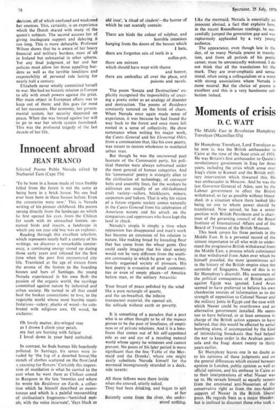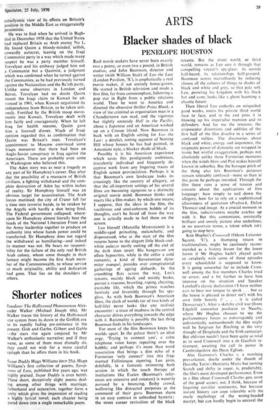Moments of crisis
D. C. WATT
The Middle East in Revolution Humphrey Trevelyan (Macmillan 65s)
Sir Humphrey Trevelyan, Lord Trevelyan as he now is, was the British ambassador in Cairo at the time of the Suez crisis of 1956. He was Britain's first ambassador to Qasim's revolutionary government in Iraq for three years, including the crisis which arose over Iraq's claim to Kuwait and the British mili- tary intervention which thwarted this. He was ambassador in Moscow. And he was the last Governor-General of Aden, sent by the Labour government to effect the British withdrawal, so far as possible without blood- shed, in a situation where there looked like being no one to whom power should be transferred. Now retired, he has a senior position with British Petroleum and is chair- man of the governing council of the Royal Institute of International Affairs and of the Board of Trustees of the British Museum. . This book covers his three periods in the Middle East. It is a personal record of the utmost importance to all who wish to under- stand the progressive British withdrawal from the Middle East, a process which culminated in that withdrawal from Aden over which he himself presided, the most ignominious act in the history of the British empire since the surrender of Singapore. None of this is to Sir Humphrey's discredit. His assessment of the political consequences of British action against Egypt was ignored. Lord Avon seemed to have preferred to believe his own clandestine sources of information as to the strength of opposition to Colonel Nasser and the military junta in Egypt and the ease with which Nasser could be overthrown and an alternative government installed. He seems too to have believed, or at least someone in charge of the British action appears to have believed, that this would be effected by aerial bombing alone, if accompanied by the kind of intimidating broadcasts that had helped the RAF to keep order in the Arabian penin- sula and the Iraqi desert twenty to thirty years earlier.
Sir Humphrey leaves one in no doubt as to his opinions of these judgments and on the general differences which existed between opinion in London, public opinion as well as official opinion, and his embassy in Cairo as to their interpretations of what Nasser was up to. He reveals himself as equally remote from the emotional anti-Nasserism of the conservative right as from the neo-Arabist support of Nasser in the British liberal press. He regards Suez as a major blunder; but is inclined to discount those-who took a cataclysmic view of its effects on Britain's position in the Middle East as exaggeratedly pessimistic.
He was to find when he arrived in Bagh. dad in December 1958 that the United States had replaced Britain as Arab enemy No 1. He found Qasim a bloody-minded,--selfish, cowardly autocrat, leaning on the Iraqi Communist party in a way which made many suspect he was a party member himself. Trevelyan and his embassy judged him not a Communist but a Qasimist, a judgment which was confirmed when he turned against the Communists, as he had previously turned against the Nationalists and the Ba'ath party. Unlike some observers in London and Beirut, Trevelyan had no doubt Qasim meant the Iraqi claim to Kuwait he ad- vanced in 196l, when Kuwait negotiated its independence from Britain, to be taken seri- ously. Fortified by the British troop move- ments into Kuwait, .Trevelyan dealt with him fairly and courageously. When he left Iraq for health reasons, Qasim gave him a farewell dinner. Much of Iraqi opinion regarded this as confirmation that Qasim was Britain's man. Trevelyan's appointment to Moscow convinced some Iraqis moreover that there had been an Anglo-Soviet conspiracy in Iraq against the Americans. There are probably even some in Washington who believed this.
The Aden story was as near a tragedy as any part of Sir Humphrey's career. Day after day the possibility of a massacre of British civilians, a fighting withdrawal and the com- plete destruction of Aden lay within inches of reality. Sir Humphrey himself was an obvious target for assassination. The Arab forces mutinied; the city of Crater fell for a time into terrorist hands, to be retaken by the Argylls with hardly a shot being fired. The Federal government collapsed; where- upon Sir Humphrey almost literally beat the heads of the National Liberation Front and the Army leadership together to produce an authority into whose hands power could be transferred. Sir Humphrey does not regard the withdrawal as humiliating—and indeed its manner was not. He bears no responsi- bility for the failure of the only real British Arab colony, whom some thought in their fantasy might become the first Arab mem- ber of the Commonwealth, to whose service so much originality, ability and dedication had gone. That lies on the shoulders of others.































 Previous page
Previous page